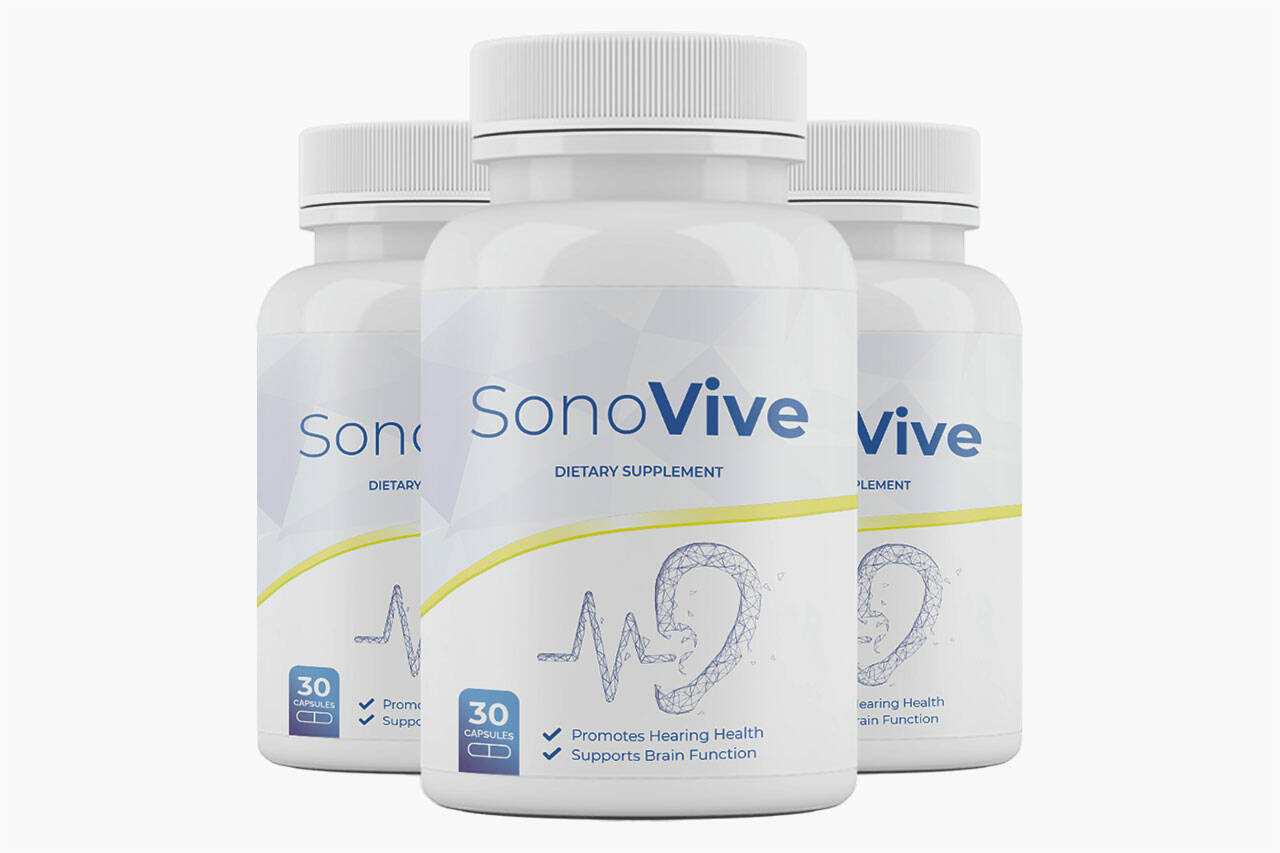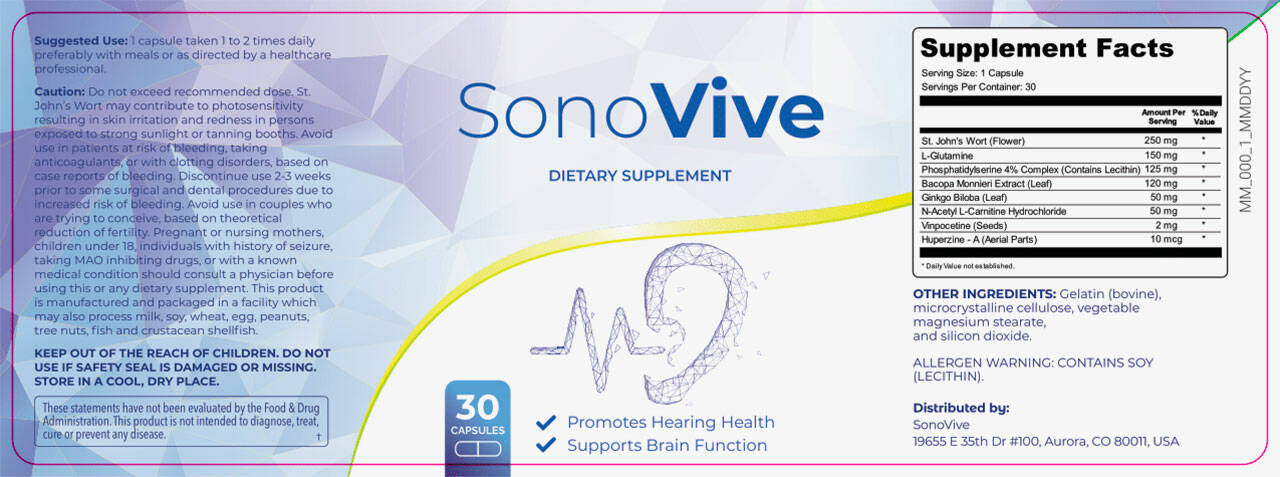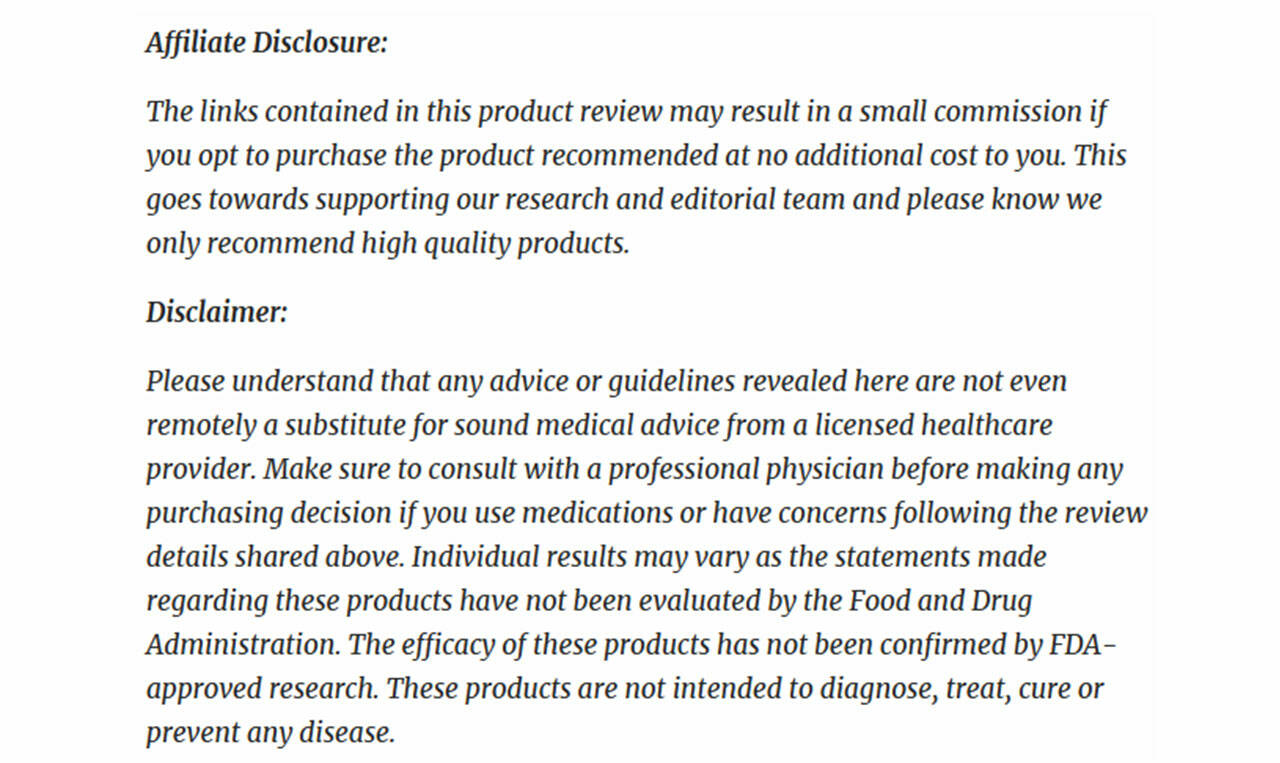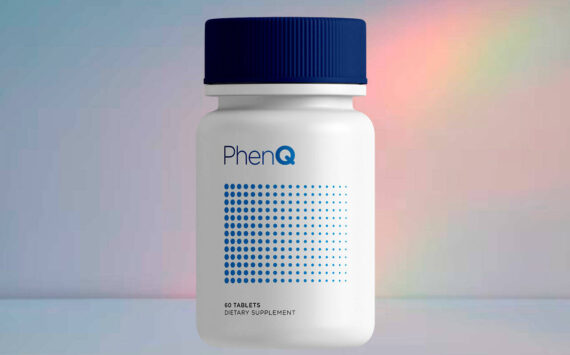It is no secret that as we age, our hearing deteriorates. But what many people don’t know is that this decay in hearing is related to overall brain function and brain health.
While hearing aids and hearing devices can help with hearing problems, they can not, however, help you restore the health of the ear or make your ears healthy again after a certain time period.
This is why there has been a recent insurgence of ear health supplements in the market. These work on an internal level by improving your brain health and brain function, which makes your auditory nerve healthier.
With these supplements, you can help get rid of hearing problems. In this article, we will be taking a detailed look at the SonoVive supplement. The SonoVive supplement makes use of medicinal herbs and traditional medicine to help your ears.
| Product Name: | SonoVive |
|---|---|
| Description: | A supplement for ear health made from natural herbs to aid in hearing and help deal with the loss of hearing due to poor brain functioning. |
| Creator: | Sam Olsen |
| Website: | https://sonovive.com/ (Only official website) |
| Ingredients: |
|
| Cost: | Starting from $69 |
| Money-Back: | 60-day, 100% money-back guarantee. |
The SonoVive supplement targets the root cause of loss of hearing and aims to help it with the help of natural ingredients. With this supplement, you can get over the loss of hearing and once again enjoy music and everyday conversations without having to rely on loud noises.
Our research and editorial staff have taken a look at the various SonoVive reviews online. These are SonoVive reviews from real customers. We have also considered things like the natural ingredients present in the SonoVive supplement and more stories from real-life users to bring you this honest review.
Keep reading to learn more about the SonoVive supplement and how the blend of its natural ingredients can help you with loss of hearing.
What Is SonoVive And How Does It Work?
SonoVive supplement is an ear health supplement that claims to improve hearing, maintain healthy hearing, and help you deal with the loss of hearing. This supplement is made using natural ingredients such as ginkgo Biloba, john’s wort, nerve tonic, and amino acids such as n-acetyl l carnitine, l-carnitine, and more.
All these ingredients are known for being good for overall brain health and brain cells. They can aid the nervous system, which can directly help with ear health.
The SonoVive supplement was created by Sam Olsen. Sam Olsen is a medical chemist who is based out of Philadelphia in Pennsylvania. Sam had worked as a medical chemist for almost 40 years. Over this period, he was fascinated by the abilities of medicinal herb plants and their overall health benefits.
This is what led him to find more herbs and natural plants that can help with improving our hearing and can reduce loss of hearing. This is how he made SonoVive with ginkgo Biloba, John’s wort, Bacopa Monnieri, acetyl l carnitine, and other natural herbs.
This blend of ingredients that he created went on to become the SonoVIve supplement which was formulated in FDA-certified GMP facilities. SonoVive supplement helps support hearing and allows people to hear better, even as they age.
Before we take a look at the components that make SonoVive, let us understand what the different types of loss of hearing and hearing problems are.
How Does Hearing Work And What Are Hearing Problems?
Before we can look at how the natural ingredients used in the SonoVive supplement can help you with your hearing problems and loss of hearing, we need to understand how we hear different sounds.
It all starts when sound waves enter the ear canal and then move towards the eardrum. These sound waves cause the eardrum to vibrate, which in turn leads to vibration of the incus, stapes, and malleus bones of the middle ear.
After these series of vibrations, the tiny ear hair that is present in the cochlea capture makes use of these vibrations and converts them into electrical signals. Our brain differentiates between these sounds based on the vibrations as different types of sounds lead to varying intensities and types of vibrations.
The electrical signals thus made by the cochlea capture are then carried by the auditory nerve to the brain, where your brain interprets these electrical signals as sounds.
As we age, this process gets affected, leading to hearing problems and loss of hearing. There are two types of loss of hearing that is commonly seen in many people. These are-
Sensorineural Hearing Loss: This is the loss of hearing brought on by lesions to the inner ear or damaged auditory nerves. In this type of loss of hearing, it is difficult to recover, even after medical treatment or surgery, as it is irreversible.
Conductive Hearing Loss: This type of loss of hearing is comparatively more common. Conductive hearing loss takes place when noises can not pass from the outer ear to the middle ear. This results in dampened or lowered loud noise. This type of hearing loss can easily be cured by due medical methods.
What Are SonoVive Ingredients?
SonoVive is made from naturally occurring ingredients that are known to improve brain function and overall brain health. These include herbs and plant-based ingredients as well as amino acid boosters that are commonly seen in nootropic supplements.
One of the key things that set SonoVive apart from other ear health supplements that claim to make your ears healthy is that all its components are known to be good for the human body and have been used in medicinal chemistry for ages.
Here are some of the active ingredients that you will find in one capsule of the SonoVive supplement:
St. John’s Wort:
St. John’s wort is a popular and powerful herb that is used in traditional medicine. It has found great use in many cultures for treating ailments and helping with overall health.
The evidence that suggests that John’s wort can improve hearing has been fairly limited, but there have been many instances where it was used to help with inflammation of the ear and the body, which can in turn help with certain hearing problems.
Traditional uses for St. John’s Wort also include the treatment of infections of the ear, healing of wounds, sleeplessness, and renal issues. It is also said to promote better blood flow in and around the ear area, which can also help with hearing. It also delays the aging process’s impact on hearing capacity.
Another well-known use of this natural herb is to ease muscle tension and for treating bruises and cuts. St. John’s wort oil is present in sufficient quantities in the Sonovive supplement, which makes it an effective nerve tonic, muscular relaxant, and mental tranquilizer. A molecule found in St. John’s wort oil communicates with the brain to control mood. Chronic anxiety and depression are also routinely treated with it.
Ginkgo Biloba:
Ginkgo Biloba is one of the most widely used herbs and naturally occurring ingredients found in countless health supplements. From weight loss supplements to brain health supplements, all have Ginkgo Biloba as their active ingredient, and rightfully so.
The leaves of Ginkgo Biloba have aromatic acid compounds that are medicinal. It also contains terpenes and polyphenols, which are known health benefits. Additionally, Ginkgo Biloba also has flavonoids that help with cognitive abilities and the immune system.
Around the ears, ginkgo also acts as a vasodilator, which is a substance that can widen blood vessels by preventing muscles from contracting. This promotes blood flow through the blood vessels smoothly. It is also great for improving sound wave propagation within the inner ear.
An ancient Chinese tree called Ginkgo Biloba is used for a variety of medical conditions. Antioxidants included in this medicinal herb aid in body detoxification. It enhances neural transmission, brain health, and brain function.
Numerous studies connect the ginkgo plant with enhanced memory, cognitive function, and attention span. To promote healthy blood circulation and cardiac function, its seeds were employed in traditional Chinese medicine.
Bacopa Monnieri Extract:
Bacopa Monnieri is another medicinal plant valued for its healing properties. It’s been used in various cultures for centuries. Bacopa Monnieri is known by many names around the world, such as hyssop, herb of grace Brahmi, etc. Irrespective of the name, its highly potent antioxidant properties are something that everyone uses.
It is a powerful medication that enhances mental agility, memory, and capacity for learning and thinking.
Antioxidants and anti-inflammatories that are found in abundance in this herb are said to help the body detoxify from toxic poisons and other unwanted substances. It can also promote rapid wound healing. Additionally, research supports its effectiveness in treating Alzheimer’s disease and hypertension.
Vinpocetine:
Vinpocetine is one of the active ingredients used in the SonoVive supplement that is also found in many nootropic supplements.
Vinpocetine is thought to act as a neuroprotectant. It has the capacity to feed cells and guarantee their functional integrity. This characteristic makes vinpocetine useful for maintaining healthy ears.
This works very much like the periwinkle plant and is often used instead of the plant in health supplements. Vinpocetine is used by many people for hearing impairment, and for protecting brain cells against injuries.
Please note that Vinpocetine is not ideally recommended for pregnant women or nursing women.
Huperzine A:
Huperzine A is found and extracted from the Chinese moss – a well-known herb in china. While the effects of Huperzine A in treating cognitive disease are still under consideration, it has been known to treat hearing impairment caused by infections of the ear.
For the purpose of avoiding memory loss and improving learning capacities, many formulations contain huperzine-A. It can also strengthen the immune system.
Amino Acids:
Apart from the above-listed ingredients, the SonoVive supplement also has a powerful blend of amino acids like N-Acetyl-L-Carnitine and L-Glutamine.
These amino acids are important for protein synthesis and, in some experimental cases, have been shown to aid in brain
What Does Science Say About SonoVive Ingredients And Ear Supplements?
There has been a lot of research and scientific evidence to suggest that the ingredients used in the Sonovive Supplement can help with hearing issues, hearing loss, and even the proper functioning of brain cells.
Some of these ingredients can also help improve brain health. As concluded by one review, the extract from the Ginkgo plant (GBE) can be used for better functioning of the brain. Many research studies have looked into the phytomedicines present in GBE and its use of it in cerebrovascular issues, memory problems, and more especially in the old and elderly.
Similarly, the other ingredients also have scientific evidence that supports the claims made by the people who use them on the regular.
How Much Does SonoVive Cost?
The SonoVive supplement is only exclusively sold through the SonoVive website, and it is fairly affordable compared to the various other supplements that claim to help with hearing problems.
There are three options available for purchasing SonoVive on the official SonoVive website. They are-
- 1 bottle – 30-day supply for $69.
- 3 bottles – 90-day supply for $177 ($59 per bottle only)
- 6 bottles – 180 – day supply for $294 ($49 per bottle only)
While the 6 bottles option offers the best value for money at just $49 per bottle, the one-bottle option is better for anyone who is just looking to test out the SonoVive supplement for the first time.
SonoVive ships internationally, but if you are in the USA, you are in luck as they offer free shipping in the entire USA.
Does SonoVive Have A Money-Back Guarantee?
With the purchase of the SonoVive supplement, you are also eligible for a 60-day no questions asked money-back guarantee.
This gives you two whole months to test out the SonoVive supplement, and in these two months, if for any reason, you think that this supplement is not for you, you can simply return the half-used or empty bottles of SonoVive supplement and avail yourself a 100% refund.
FAQs
What is hearing loss?
Hearing loss can be caused by several factors, including aging and infections of the ear. The most common type of hearing loss in older people is presbycusis (also known as age-related loss of hearing).
Presbycusis occurs when the hair cells in your inner ear stop working properly, causing you to lose some or all of your ability to hear high frequencies.
Other types of loss of hearing include sensorineural loss of hearing, which results from damage to the nerve that carries sound information from your outer ear to your brain; conductive loss of hearing, which occurs when there’s an obstruction between your external auditory canal and middle ear; and mixed loss of hearing, which includes both conductive and sensorineural loss of hearing.
How do I know if I have a loss of hearing?
If you suspect you may have hearing loss, talk with your doctor about testing for loss of hearing. You might also want to ask your doctor whether you should wear hearing aids.
If you wear them, they will help amplify sounds so you can better understand speech. Your doctor can tell you more about how hearing aids work and what kind would best suit your needs.
How are hearing tests performed?
There are two main ways to test your hearing: audiometry and otoacoustic emission (OAE) testing. Audiometric testing involves having someone speak into one of your ears while you listen through the other ear using headphones.
An audiologist will play tones of different pitches and volumes, and you will respond by pressing a button on a device called a stethoscope. This allows the audiologist to measure the volume at which you hear each tone.
Otoacoustic emissions testing uses a small microphone placed inside your ear canal to pick up tiny vibrations created by sound waves passing through your eardrum.
These vibrations are then amplified and displayed on a computer screen. Both methods allow the audiologist to determine the range of frequencies within which you can hear.
How accurate are hearing tests?
The accuracy of hearing tests depends on several things, including the equipment used, the skill level of the tester, and the patient’s cooperation. However, even if the results aren’t 100 percent accurate, they still provide valuable information that can guide treatment decisions.
Can hearing tests predict future hearing loss?
No. Hearing tests can identify hearing problems early, but it doesn’t mean those problems will get worse over time.
For example, many people who experience noise-induced hearing loss recover completely after the exposure has ended.
But because this condition often affects only certain frequency ranges, it can take months or years before symptoms improve.
What causes hearing loss?
Aging is the leading cause of hearing loss. As we grow older, our bodies produce less oxygen, which damages the hair cells in our inner ear. In addition, the fluid surrounding these hair cells becomes less viscous, making it harder for us to detect sound.
Hearing loss due to infection is usually temporary. But if bacteria enter the middle ear, they can lead to permanent hearing loss. Ear infections can occur in children or adults, but young children are especially prone to ear infections because their immune systems aren’t fully developed yet.
Other conditions that can cause hearing loss include:
- Meniere’s disease – A disorder characterized by episodes of vertigo, nausea, and ringing in the ears. It is sometimes associated with tinnitus (ringing).
- Ménière’s syndrome – A combination of Ménière’ s disease and sudden sensorineural hearing loss.
- Otosclerosis – A rare genetic disorder that causes bone growths to form around the middle ear. The bones become thick and hard, preventing normal movement of the eardrum.
- Tumors – Certain types of tumors can press against the nerves that carry signals from the inner ear to the brain.
- Trauma – Any type of injury to the head or neck can damage the delicate structures of the ear.
- Birth defects – Some congenital disorders, such as cochlear nerve hypoplasia, result in hearing loss.
- Stroke – Damage to the auditory cortex in the brain can cause hearing loss.
- Diabetes – Diabetics may have increased blood glucose levels, which can affect the ability of neurons to transmit messages between the inner ear and the brain.
Is there anything I can do about my hearing?
If you want to prevent further loss of hearing, make sure you protect your ears from loud noises. If you work in an environment where you regularly encounter loud sounds, consider wearing earplugs or earmuffs. You should also avoid situations where you might be exposed to loud noises, like concerts, sporting events, or noisy restaurants.
You can also try taking steps to reduce the impact of any existing hearing loss. Speak clearly when talking on the phone, and use high-quality headphones when listening to music.
When watching TV or movies, turn down the volume so you don’t need to strain to hear what’s being said. And if you wear glasses, ask your optometrist whether a hearing aid would help.
The most common symptom of loss of hearing is difficulty understanding speech. People with mild loss of hearing may not notice any difference in how well they understand conversations.
However, moderate or severe loss of hearing can make it difficult to follow conversations, even at a normal speaking level.
Final Verdict – Is SonoVive Legit, And Should You Buy SonoVive?
If you are looking for a supplement to help you with hearing problems, we suggest you give the SonoVive supplement a try.
Although there is limited information and limited SonoVive reviews online, we found that the components used by them have legit benefits.
Before taking any supplement, don’t forget to consult with your licensed healthcare provider, as the opinions expressed in this article aren’t meant to be a substitute for due health advice or treatment.
RELATED POSTS:










